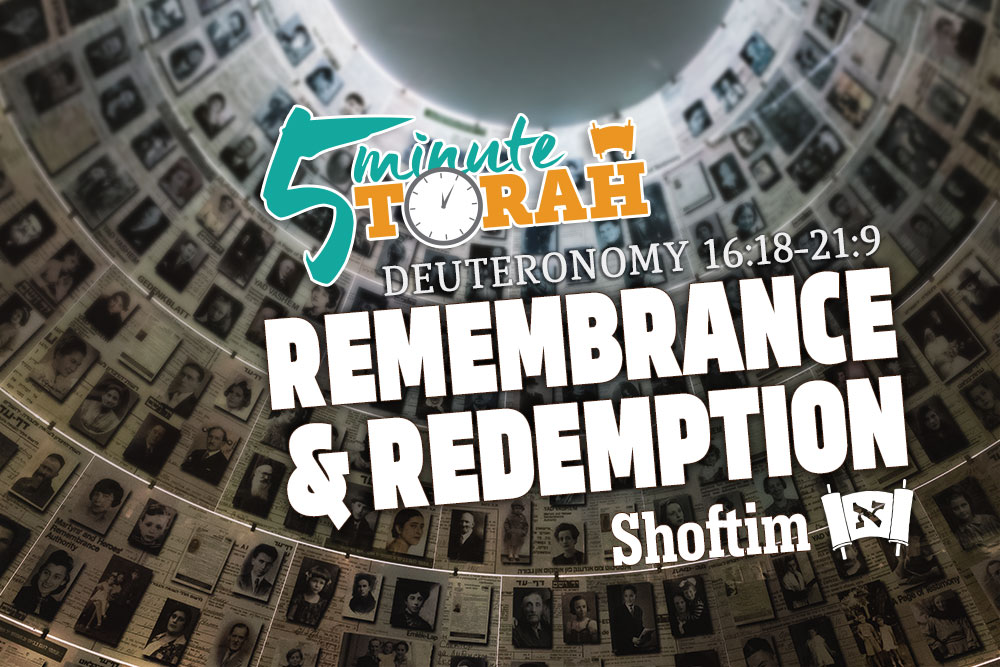Remembrance and Redemption
Series:

Deuteronomy 16:18-21:9
As one exits the Yad Vashem Holocaust museum in Jerusalem, the final site is a sign written in Hebrew and in English. It is a profound quote from the Baal Shem Tov, the founder of Chassidic Judaism in the eighteenth century:
Forgetfulness leads to exile, while remembrance is the secret of redemption.
What does this mean? Let’s explore the implications. According to our Torah portion for this week, the king of Israel is commanded to write a copy of the Torah for himself as a reminder of his responsibilities as the leader of a holy nation bound to a covenant relationship with the Creator of the Universe:
And when he sits on the throne of his kingdom, he shall write for himself in a book a copy of this law, approved by the Levitical priests. And it shall be with him, and he shall read in it all the days of his life, that he may learn to fear the LORD his God by keeping all the words of this law and these statutes, and doing them, that his heart may not be lifted up above his brothers, and that he may not turn aside from the commandment, either to the right hand or to the left. (Deuteronomy 17:18–20)
The king of Israel represents the nation of Israel. Therefore, when the king is diligent to uphold the Torah, he is considered righteous and the nation is blessed. But when the king forgets the precepts of the Torah, he is deemed wicked and the nation is therefore judged and led into exile.
Since the king represents Israel, some of his responsibilities also represent those of individual citizens. Deuteronomy 31:19 says, “Now therefore write this song and teach it to the people of Israel.” This is considered to be the very last in the enumeration of the 613 commandments, and is interpreted to mean that every Jewish person is obligated to in some way—often through contributing to the production of a new Torah scroll—write for himself a copy of the Torah. Just as the king is obligated to have his own copy of the Torah to study, so are his citizens.
As citizens of the Kingdom, it would behoove us to possess a copy of the Torah in the form of a Chumash (a book that contains both the Hebrew and English of the Torah along with commentary) and study it daily. Through constant, daily study it will sink into our hearts in order that we “may not turn aside from the commandment, either to the right hand or to the left,” but follow the LORD wholeheartedly. If we do this while clinging to our righteous Messiah, we have the potential to become emissaries of the Messianic Era in our present, broken world. Through this process, we can get a glimpse into the hope that the prophet Jeremiah says awaits us:
Behold, the days are coming, declares the LORD, when I will make a new covenant with the house of Israel and the house of Judah. … I will put my law within them, and I will write it on their hearts. And I will be their God, and they shall be my people. And no longer shall each one teach his neighbor and each his brother, saying, “Know the LORD,” for they shall all know me, from the least of them to the greatest, declares the LORD. (Jeremiah 31:31, 33–34)
Until the time in which the Torah is written on our hearts and a man will not have to teach his neighbor, we would do well to study it every day so that we “may not turn aside from the commandment, either to the right hand or to the left.” But until then, we must study the Torah diligently every day to discern the “good and perfect will of God” in our lives, and be faithful in all that He has called us to. Indeed, forgetfulness leads to exile, but remembrance is the key to unlocking redemption. Will you help bring tikkun (repair) to the world by remembering what others have forgotten?








